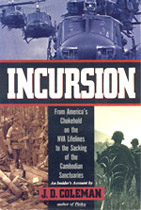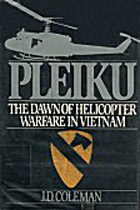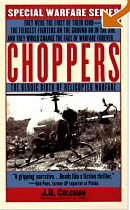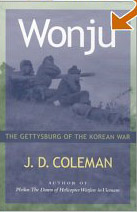









|
|
Incursion: From America's Chokehold on the Nva
Lifelines to the Sacking of the Cambodian Sanctuaries
 |
By the author of Pleiku , this is an informative look at
the interdiction campaign in central Vietnam from late 1968 to 1970 that
culminated in the most controversial operation of the war, the incursion
into Cambodia in May-June 1970. Using the 1st Cavalry Division as his
narrative centerpiece, Coleman reveals for the first time how
brilliantly successful that division was in interdicting supply and
reinforcement routes from Cambodia to Viet Cong bases around Saigon, how
this forced the enemy to expand bases in Cambodia and how President
Nixon finally made the momentous decision to send U.S./South Vietnamese
forces into that neutral country to destroy the Communist "sanctuaries."
Coleman, an information officer with the 1st Cav during the period in
question, provides a vivid and well-balanced account of the diplomatic
as well as the military aspects of the incursion, and shows how public
opinion in the United States affected the political direction of this
phase of the war in Southeast Asia. ---From Publishers Weekly |
Pleiku: The Dawn of Helicopter Warfare in Vietnam
 |
Coleman's book is a unit history of the first
large-scale battle between North Vietnamese regulars and the newly
reorganized cavalry of the U.S. Army, which used helicopters for troop
and material movements and close-fire support. The author, who was
involved and wrote the official after-action report on the Ia Drang
Valley of October and November 1965, uses the traditional arrangement of
order of battle, tactical conditions, and a description of the fighting.
He also includes much information now available from the other side, as
the 33d North Vietnamese Regiment planned a major attack against the
American forces. This action in Pleiku province was the first trial in
combat of the 1st Air Cavalry's helicopter tacticstactics which, in this
case, rendered the North Vietnamese Army powerless. --From
Library Journal |
Choppers : The Heroic Birth Of Helicopter Warfare (Choppers) (Paperback)
 |
"A gripping narrative...Reads like a fiction thriller."--Bob Poos,
former AP reporter at Pleiku
"Splendid...A meticulous re-creation."--Joseph Galloway, U.S. News
& World Report, former UPI reporter at Pleiku
"A vivid account...gripping."-- Kirkus Reviews"A gripping
narrative...Reads like a fiction thriller."--Bob Poos, former AP
reporter at Pleiku
"Splendid...A meticulous re-creation."--Joseph Galloway, U.S. News
& World Report, former UPI reporter at Pleiku
"A vivid account...gripping."--Kirkus Reviews |
Wonju: The Gettysburg of the Korean War (Hardcover)
 |
Coleman, now a retired lieutenant colonel, was a
sergeant in the 187th Regimental Combat Team and survived the brutal
fighting in February 1951 for the critical central South Korean town of
Wonju. Mixing personal memories, oral history, and thorough research in
primary and secondary sources, he traces the Korean War's first eight
months with an unsparing eye for the strengths and weaknesses of both
sides. He then focuses on the Chinese Fourth Offensive, which met an
Eighth Army that, transformed by General Matthew Ridgway, refused to
retreat and used its superior firepower to deadly advantage. Traditional
accounts of the decisive U.N. victory in the battle emphasize the
fighting around Chip'young Ni, but Coleman's detailed account of the
fighting around Wonju stresses its equal role in taking stra- tegic
initiative away from the Chinese. Even in very good accounts of very
ugly firefights, Coleman remains evenhanded, which helps him produce an
exceptionally worthy addition to Korean War battle literature. Roland
Green © American Library Association. |
|











